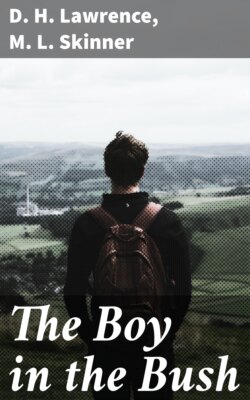Читать книгу The Boy in the Bush - D. H. Lawrence - Страница 16
На сайте Литреса книга снята с продажи.
III
ОглавлениеLen unhitched four heavy horses, led them into the yard, and put the ropes into Jack's hands. The child marched so confidently under the noses of the great creatures, as they planted their shaggy feet. And he was such a midget, and with his brown bare arms and bare legs and feet, and his vivid face, he looked so "tender." Jack's heart moved with tenderness.
"Don't you ever wear boots?" he asked.
"Not if I k'n help it. Them kids now, they won't neither, 'n I don't blame 'em. Last boots Ma sent for was found all over the manure heap, so the old man said he'd buy no more boots, an' a good job too. The only thing as scares me is double-gees: spikes all roads and Satan's face on three sides. Ever see double-gees?"
Len was leading three ponderous horses. He started peering on the road, the horses marching just behind his quick little figure. Then he found a burr with three queer sides and a sort of face on each side with sticking-out hair.
He was a funny kid, with his scraps of Latin and tags of poetry. Jack wondered that he wasn't self-conscious and ashamed to quote poetry. But he wasn't. He chirped them off, the bits of verse, as if they were a natural form of expression.
They had led the horses to another stable. Len again gave the ropes to Jack, disappeared, and returned leading a saddled stock-horse. Holding the reins of the saddle-horse, the boy scrambled up the neck of one of the big draft-horses like a monkey.
"Which are you goin' to ride?" he asked Jack from the height. "I'm taking three an' leading Lucy. You take the other three."
So he received the three halter ropes.
"I think I'll walk," said Jack.
"Please y'self. You k'n open the gates easy walkin'; and comin' back I'll do it, 'n you k'n ride Lucy an I'll ride behind pinion so's I can slip down easy."
Yes, Lennie was a joy. On the return journey, when Jack was in the saddle riding Lucy, Len flew up behind him and stood on the horse's crupper, his hands on Jack's shoulders, crying: "Let 'er go!" At the first gate, he slid down like a drop of water, then up again, this time sitting back to back with Jack, facing the horse's tail, and whistling briskly. Suddenly he stopped whistling, and said:
"Y've seen everybody but Gran an' Doc. Rackett, haven' you? He teaches me—a rum sortta dock he is, too, never there when he's wanted. But he's a real doctor all right: signs death certificates an' no questions asked. Y' c'd do a murder, 'n if you was on the right side of him, y'd never be hung. He'd say the corpse died of natural causes."
"I didn't know a corpse died," said Jack laughing.
"Didn't yer? Well yer know now!—Gran's as good as a corpse, an' she don't want her die. She put on Granfer's grave: 'Left desolate, but not without hope.' So they all thought she'd get married again. But she never.—Did y' go to one of them English schools?"
"Yes."
"Ever wear a bell-topper?"
"Once or twice."
"Gosh!—May I never go to school, God help me. I should die of shame and disgrace. Arrayed like a little black pea in a pod, learnin' to be useless. Look at Rackett. School, an' Cambridge, an' comes inter money. Wastes it. Wastes his life. Now he's teachin' me, an' th' only useful thing he ever did."
After a pause, Jack ventured.
"Who is Dr. Rackett?"
"A waster. Down and out waster. He's got a sin. I don't know what it is, but it's wastin' his soul away."
